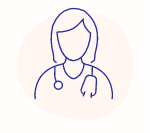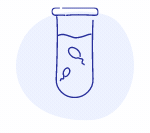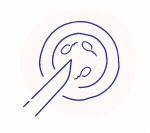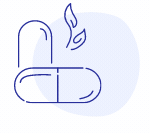About Us
Patient safety is our main focus. There are adequate space and facilities, modern medical equipment and instruments in the Centre, all of which meet the high standards of the needs of the patients.

Northway Fertility Centres, the largest chain of fertility centres in the Baltic States, is now entering its second decade of operation. This facility stands as one of the foremost fertility centres in Europe, integrating four cutting-edge laboratories located in Vilnius, Kaunas, Klaipėda and Riga that adhere to the highest standards. With a team of skilled specialists and embryologists, this modern facility is dedicated to fulfilling patients’ dreams through advanced fertility treatments. The Fertility Centre’s specialists genuinely care and are by your side at every step of your fertility journey.
Northway Fertility Centres are proud to have the largest team of the most highly skilled medical specialists in Lithuania. Investigating and treating fertility disorders often requires the input of experts from a range of fields, and our centres offer consultations and procedures performed by the following specialists:
Throughout the treatment, patients receive personalized care from a personal coordinator who is always ready to help and answer any questions, ensuring the couple’s comfort and peace of mind.
The laboratory at the fertility clinic is a unique environment where new life is brought into the world, and is therefore subject to very high standards. All Northway Fertility Centres are equipped with state-of-the-art laboratories that adhere to the highest standards, advanced techniques for embryo growth and evaluation methods, and a quality system.
While some couples search for the most reliable birth control methods, other couples are still dreaming of having children due to unsuccessful attempts. According to statistics, infertility affects up to one-fifth of Lithuanian households.
It is recommended that a woman should become pregnant within a year if there are no underlying issues and she is not using any form of contraception. If she doesn’t succeed in conceiving within this period, a couple should see an infertility treatment specialist. Both partners are recommended to apply for treatment as both should be tested at the same time.
Women over 35, women with a history of genital inflammation, ovarian problems, miscarriage, ectopic pregnancy or voluntary termination of pregnancy, as well as when certain known fertility disorders are preventing a couple from conceiving (e.g. abnormalities in the man’s sperm), are advised to see a doctor after 6 months of failed attempts at conception.
Obstetricians/gynecologists consult and examine women about reproductive concerns, whereas andrologists or urologists consult and examine men about fertility.






We provide infertility treatment services reimbursed by the Compulsory Health Insurance Fund. Reimbursed services are available at all Northway fertility centres in Lithuania: Vilnius, Kaunas and Klaipėda.
Learn moreOn your fertility journey, you will be accompanied by a broad team of highly skilled specialists. Fertility clinics are staffed by fertility specialists who provide consultations and procedures, including obstetricians/gynecologists, embryologists, andrologists/endocrinologists, urologists, lifestyle medicine specialists, medical psychologists, and acupuncture specialists. Patients receive personalized care from a personal coordinator.
We've been helping people have children for 12 years.
A wide team of skilled medical experts will take care of your reproductive health.
Consultations, tests, medical and surgical treatments, assisted reproduction procedures, reproductive cell freezing, donation programmes.
State-of-the-art laboratory equipment, cutting-edge embryo production and evaluation methods and a quality system.
Assisted reproduction services can be reimbursed by the the Territorial Health Insurance Funds.
We accompany you at every step. You can choose to undergo all procedures in Vilnius, Kaunas, Klaipėda or Riga.
Every second patient
of our centre gets pregnant
after the first attempt
7 out of 10 women
get pregnant within 2 years
With our assistance,
over 3000 women
have become pregnant
It is recommended to see an obstetrician/gynecologist, a specialist in infertility treatment, if you have been unable to conceive for 12 months without any obvious issues and without using any contraception.
In case of risk factors such as the partner being over 35 years old, diagnosed reproductive organ dysfunctions or diseases, previous miscarriages, and other known fertility issues (e.g., changes in male sperm), it is recommended to seek consultation after six months of unsuccessful attempts to conceive.
A woman should have her first consultation, which usually includes an ultrasound examination, right after her period.
You don’t need to prepare for your first consultation. You should come in as soon as your menstrual period is over, which is about a week after the start of your cycle.
An infertility treatment specialist is someone you can trust to guide you through a difficult journey. They will look after you and answer all of your questions. You get to choose your doctor.
Northway Fertility Centres are located in all major Lithuanian cities, i.e. Vilnius, Kaunas and Klaipėda. We also have a branch in Riga, Latvia.
It’s not required but various sources report that 40% of infertility in couples is caused by women’s health problems, 40% by men’s health problems, 10% by immunological incompatibility, and 10% by a cause that remains unclear. This means the problem is likely to be related to both female and male factors. Men should have a spermogram (known as semen analysis), a simple but important test. This approach saves time and allows us to identify the root of the problem.
The fertility tests will be carried out in line with the couple’s situation. During the first consultation, the woman undergoes an examination and has an ultrasound, while the man is recommended to have a spermogram. Blood tests may be recommended, as well as referrals to other specialists (such as a urologist or an andrologist).
Yes. A fertility specialist is a clinician who should not necessarily be associated solely with IVF procedures. Fertility specialists provide consultations, conduct examinations, and carry out necessary tests. They often collaborate with other specialists when potential issues are identified through testing, which, once addressed, can enable the couple to conceive successfully through natural means.
Yes, for your convenience, you can choose between a face-to-face or remote consultation with an infertility specialist.
The woman should have an ultrasound exam, hormonal tests and a tubal patency test. The man should have a semen analysis.
While there is no obligation to take this test, we strongly advise doing so to eliminate any potential infertility issues in the man and to focus on a more comprehensive examination of the woman.
Ejaculate (semen) is obtained through masturbation and collected in a wide-necked, sterile, and warm glass or plastic jar with a wide neck. You need to cleanse your penis before masturbation. It is recommended to collect the ejaculate at least 48 hours and no more than seven days after the last sexual intercourse. In the 2-3 days prior to providing the ejaculate, it is advisable to avoid hot baths, alcohol consumption, and if you smoke, it is suggested to reduce the number of cigarettes smoked.
Of course, but you should contact the case manager, who will provide you with a list of the tests you need to carry out.
IUI, or intrauterine insemination, is the process of collecting sperm (from a male partner or a donor) and injecting it into a woman’s uterus. This procedure is often recommended when there are abnormalities detected in the male’s sperm or due to changes in the woman’s physiology that prevent natural conception. On the other hand, IVF involves collecting reproductive cells from both partners (or using donor cells), fertilizing them, culturing the blastocyst, and subsequently transferring it into the woman’s uterus.
ICSI is an intracytoplasmic sperm injection. During the ICSI procedure, the strongest sperm is selected and injected into the egg. This method is used when there is poor sperm quality, slow sperm motility, or abnormal morphology.
A fresh embryo is transferred during the same cycle, meaning immediately after the blastocysts have developed. Another option is to freeze the embryo and plan the transfer for a later date.
On the third day, the embryo consists of about 8 cells, while the blastocyst on the fifth day has over 100 cells and is further along in its development. It is transferred into the fallopian tubes and over the next few days, it travels through the typical pathway of the egg in the woman’s body toward the uterus. During the development of the embryo between these two days (day 3 and day 5), natural selection occurs, and only the strongest embryos survive.
The topic is quite controversial, and there are situations where the decision is made to implant a day 3 embryo. For example, this may occur when the woman is older, there are very few embryos obtained from previous cycles, it is known that embryos have not developed by the fifth day, or stimulation lasted longer than usual. In such cases, the transfer of a day 3 embryo may also be performed.
The current regulations in Lithuania stipulate that tests for sexually transmitted diseases remain valid for up to six months, while clinical blood tests are valid for up to ten days before the procedure.
Yes, it is. In some cases, it may take several cycles to achieve a successful result.
There is no age limit. With assisted reproductive techniques, the probability of conception increases to 50% for women under 35 years old, 18% for women over 40, and 5–6% for those over 43.
You can apply because the procedure can be performed in Latvia. In Lithuania, only married couples can have the procedure according to the legislation.
One of the most typical reasons for using an egg donation program is a low ovarian reserve. It is not uncommon for young women to go through early menopause or have a low egg count for a variety of reasons, including diseases, operations, and so on. If your AMH (anti-Müllerian hormone) levels are extremely low, it means that your eggs are not forming, and you will most likely be unable to conceive on your own. Under normal conditions, this hormone level begins to decline at the age of 43.
The egg donation program is also considered for treatment-resistant ovarian failure, recurrent unsuccessful IVF cycles (more than three), when the patient has undergone radiation therapy, chemotherapy, or has a diagnosed genetic disorder.
The sperm donation program is used in cases of severe sperm pathology, ejaculation disorders, a high risk of transmitting a serious condition that can cause severe disability, or when the male is a carrier of a sexually transmitted disease.
Yes, when choosing a sperm donor or an egg donor, you select individuals based on external traits similar to your couple’s.
In the case of sperm donation, the genetics of the partner contributes to determining the external characteristics of the future child. In the case of egg donation, the genetics of the partner also influences the external traits of the future child.
Infectious disease and sexually transmitted infection (STI) testing is performed, along with a clinical assessment. If the results are negative, an additional DNA karyotype analysis is carried out. Donors are also evaluated by a psychiatrist, and screening for narcotic substances is performed.
Specialist doctors carefully evaluate the results. The donor’s family is checked for the absence of any known genetic disorders.
Age, height, weight, hair and eye colour, and blood type.
Each couple’s situation is unique. Therefore, a comprehensive evaluation of both the woman and the man is required before planning, to determine whether this procedure is recommended for the couple and whether it is likely to provide the desired outcome.
There are no age limits for IVF using donor eggs or embryo.
Yes. Our fertility centre in Riga, Latvia, welcomes single women.
The laws on assisted reproduction in the Republics of Latvia and Lithuania prohibit the selection of embryos based on sex. Exceptions are applied only in cases where there is a risk of inheriting genetic diseases.
The reasons can be numerous and may include lifestyle, diet, harmful environmental factors, heat, vibration, radiation, chemical factors such as endocrine disruptors (various solvents, herbicides, etc.), chronic stress, the use of alcohol, cannabinoids, smoking, being overweight, and the use of steroidal hormones during sports can all negatively impact sperm quality.
Quit smoking and drinking alcohol, and avoid hot baths, saunas, and long hot showers. Try to prevent stress, relax more frequently, engage in greater physical activity, and lose the extra weight if you are overweight. It is also recommended that you drink less coffee and more water. A regular sex life, i.e. having sex several times per week, helps to improve sperm quality, but having sex too frequently is also unhealthy. Lubricant should be avoided.
Increase the amount of oily fish you consume, such as salmon, sardines, and pike. Eat more vegetables and fruits, which are high in vitamins, antioxidants, and minerals that can boost sperm count. Include foods containing zinc and folic acid in your diet. Zinc-rich foods include beef, fish, and eggs, whereas folic acid is found in green vegetables, aubergines, and whole meal bread. A zinc shortage in the body can reduce sperm count by up to 90%.
A high consumption of vegetables, fruit, high-fiber foods, omega-3s (fish and other seafood), chicken, antioxidant-rich meals (vitamins E, C, and D, B-carotene, selenium), and low-fat or skim milk all boost sperm quality.
Caffeine-rich foods, alcohol, sweets and sweetened beverages, trans fats (margarine, spreadable fats, biscuits, cakes, pies, pastries, baked goods, fried products), proteins (processed meats such as fried meats), soya products, and potatoes, cheese and dairy products all reduce sperm quality.
If no spermatozoa are detected in the ejaculate, a TESA procedure (testicular sperm aspiration) is required. During this procedure, samples are taken directly from the testicles using a needle, and spermatozoa are searched for in those samples. If sperm are found, an ICSI procedure can be performed. However, if no sperm are found, ICSI is not possible, and in such cases, donor sperm is needed.
It is likely, but not always the case. In all cases, both spouses are examined, and after a significant period of changes that could affect conception, there may be changes in the woman’s body too. In this instance, it may be fair to begin by evaluating the partner (by sperm analysis), but a thorough check of the woman is also recommended.
If both fallopian tubes are blocked, then no, natural conception is impossible. Generally speaking, there is almost never a 100% certainty in medicine. It’s important to consider which test was used to confirm the patency of the fallopian tubes, as some tests are very accurate and sensitive, with minimal chances of misinterpretation. In contrast, others may have higher margins of error. Even after sterilization, there is less than a 1% chance that the patency of the fallopian tubes could be restored. In any case, waiting and hoping for a miracle is not the best approach. It is advisable to consult a fertility specialist with this diagnosis.
No, having PCOS does not necessarily mean you need to plan for assisted reproduction right away. There is a high likelihood that medication, known as ‘ovulation induction,’ may be sufficient in this case. In any case, it is recommended that you consult a fertility specialist with this diagnosis, who will examine you and prescribe the mentioned (or other) treatment.
Yes, it is possible because endometriosis can fall into different stages. If we’re talking about stage I or II endometriosis, where both fallopian tubes are open, natural conception is achievable. However, if the endometriosis is at stage III or IV, especially if the fallopian tubes or ovaries are damaged, assisted reproductive technology may be necessary.
Male infertility accounts for up to 50% of all infertility cases and is related to changes in sperm quantity and quality. Northway Fertility Centress offer a full range of male infertility treatment services, from fertility testing to surgical treatment and modern assisted reproductive procedures.
Learn more